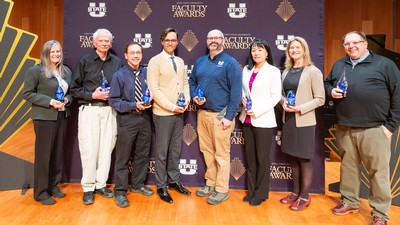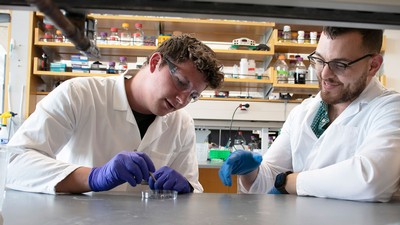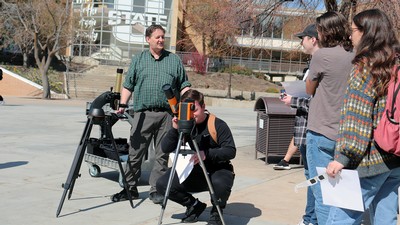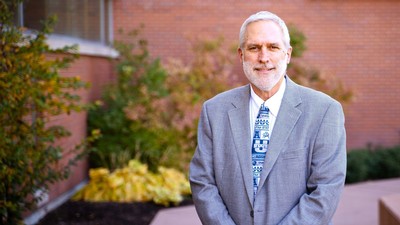Hemp Research Underway at Utah State University
Exploring collaborations with University of Utah College of Pharmacy.
By Lynnette Harris |
Professor Bruce Bugbee is conducting research on hemp for to optimize yield and quality of hemp for botanical medicines.
Scientists at Utah State University are studying cultivation practices to optimize the yield and quality of hemp for botanical medicines.
Professor Bruce Bugbee, who specializes in the use of controlled environments to study crop growth and yield, leads the research project. Bugbee obtained permits to grow hemp from the Utah Department of Agriculture and Food and began the studies under LED lights in controlled chambers in February. Rooted hemp cuttings of federally approved low-tetrahydrocannabinol (THC, less than 0.3%) cultivars of Cannabis sativa were provided by growers in Colorado and Kentucky. Pineae Greenhouses in Ogden, Utah, has provided growing media and additional support for the research.
“The 2018 Farm Bill legalized the cultivation of hemp, and it makes sense for USU to be involved in this research, just as we have done with crops for more than 130 years,” said Ken White, dean of USU’s College of Agriculture and Applied Sciences. “It is a potentially important crop for Utah farmers and growers, and our mission as a land-grant university is to do research that helps people in agriculture.”
Bugbee explained that there are multiple goals for the research, but the primary focus is on the genetics and environmental conditions that produce cannabis flowers with high cannabidiol (CBD) and very low THC content. The Farm Bill defines hemp as cannabis that has less than 0.3 percent THC, the psychoactive compound that makes people intoxicated. It is not possible to become intoxicated from the hemp/cannabis cultivars being used in this research, Bugbee added.
Changes in state and federal laws that have legalized the cultivation of hemp/cannabis for CBD oil production provide opportunities for Utah farmers and growers. But because growing hemp/cannabis has been illegal in the United States for several decades, it has been difficult for plant scientists to conduct research.
Bugbee said there are numerous claims about how to grow hemp/cannabis, but few scientific studies have been conducted in the United States.
White said that, for at least the past two sessions of the Utah Legislature, some lawmakers have questioned whether CBD oil is truly effective, and he is glad the state’s leading research universities are working to provide answers.
“This establishes an opportunity for us to study the physiology and genetics of the plants and allows the products to be pharmaceutically evaluated in university research laboratories,” White said.
Bugbee pointed out that many important pharmaceuticals have been derived from plants, and there is potential for this research to produce a new class of botanical medicines. Based on this emerging research, he was recently invited to speak at a national conference on hemp/cannabis.
Flowers, leaves and stems will be harvested at regular intervals, and Professor Bill Doucette, an environmental chemist in USU’s Department of Civil and Environmental Engineering, will extract and analyze the tissues to characterize the cannabinoids. “A central goal is to determine the effect of plant growth stage and environmental conditions on CBD and THC concentrations,” Doucette said.
Doucette and Bugbee have previously worked with federal and state agencies and private companies to study the use of plants to remove organic compounds from contaminated soils. This research builds on their ongoing collaborative studies.
USU will optimize the growth of the plants, extract and characterize the cannabinoids and make CBD oil. Then the research will move to the University of Utah’s School of Pharmacology.
Professor Karen Wilcox, chair of the University of Utah’s Department of Pharmacology and Toxicology, is exploring collaborations with Bugbee and Doucette on the project. Wilcox and others in the department already study cannabinoids and are accustomed to protocols for working with compounds from hemp/cannabis.
“We look forward to a potential collaboration to study the pharmaceutical uses of cannabinoids in our epilepsy research,” Wilcox said. “This is an exciting opportunity between our department and USU scientists in agriculture and engineering.”
Researchers
Bruce Bugbee is a professor of crop physiology in Utah State University’s Department of Plants, Soils and Climate. He and his students have worked with NASA for over 30 years to develop a biological life support system for Mars, where people will grow their own food. In 2011, he received the Utah Governor’s Medal for Science and Technology, and in 2016 the D. Wynne Thorne Research Lifetime Achievement Award. He gave a TEDx talk entitled, “Turning Water into Food.”
Bill Doucette is a professor of environmental engineering in USU’s Department of Civil and Environmental Engineering and associate director of the Utah Water Research Laboratory. His research interests include measuring the physical/chemical properties of organic compounds to assess their movement and fate in the environment.
Karen Wilcox chairs the Department of Pharmacology and Toxicology in the University of Utah’s College of Pharmacy. Her laboratory studies basic mechanisms underlying epileptogenesis and seizure generation. She is the principal investigator of the Anticonvulsant Drug Development Program.
Professor Bill Doucette will extract and analyze the tissues to characterize the cannabinoids.
Two varieties of plants with high cannabidiol (CBD) and very low THC content are being studied under different growing conditions.
WRITER
Lynnette Harris
Marketing and Communications
College of Agriculture and Applied Sciences
435-764-6936
lynnette.harris@usu.edu
CONTACT
Lynnette Harris
Marketing and Communications
College of Agriculture and Applied Sciences
435-764-6936
lynnette.harris@usu.edu
Kathy Wilets
Director
University of Utah Media Relations
801-581-5717
Kathy.wilets@utah.edu
TOPICS
Research 878stories Society 503stories Health 308stories Agriculture 225stories Plants 186storiesComments and questions regarding this article may be directed to the contact person listed on this page.












